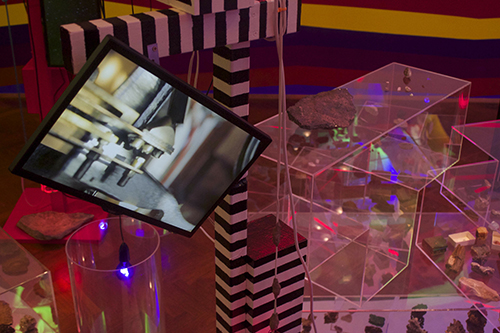From Stella Rosa McDonald…
The garden of half-life is best described as a journey to the centre of the earth. The exhibition is the result of an invitation from Sydney University to Mikala Dwyer to work with the university’s collections. Dwyer has almost literally unearthed these materials, as they are usually (and somewhat inexplicably) stored in an underground bunker unseen by the public. The artist, long fascinated with the conceptual divisions between the alchemical and scientific and drawing upon the university’s vast collection of minerals and rocks, has re-indexed the university’s catalogue of earth.
The ‘garden’ is entered via a spiral staircase along which Dwyer has completed a wall painting based on cross-sections of geological formations. Inside the gallery videos, bracketed by fluorescent lights and ultraviolet lamps, depict more vast interiors: one explores an inverse view of a cave while another, featuring spoken hypnosis, alludes to the vast interior of the mind. The minerals, rocks and even meteorites listed in the work details read like a territorial poem: Kerosene Shale, Carbonate veins in mudstone and Calcite from New Guinea. An entire drawer, labelled ‘Minerals, Broken Hill’. The sculpture Fetish rock, 2014— a large protuberance of clay with coins embedded in it—is a striking intervention amongst the intriguing collections of rocks and crystalline forms. The work is perhaps emblematic of the exhibition for the way it fuses the abstract value of the materials to their archaeological and cosmological history.
Until January 17, 2015
Sydney University Art Gallery, Camperdown
Pic: Mikala Dwyer, the garden of half-life, 2014, installation view, University Art Gallery, The University of Sydney. Photograph © Alejandra Canales

![Yo La Tengo | Nuclear War [NSFW]](https://theartlife.com.au/wp-content/themes/blogim/assets/img/fallback-360x245.jpg)